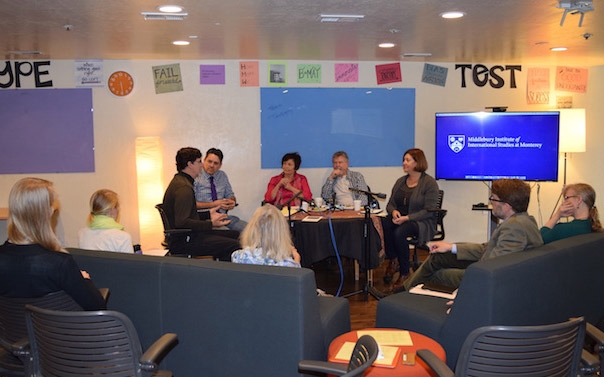Celebrating Innovation in Education Across Middlebury

A two-day celebration of Middlebury’s Fund for Innovation showcased a wide range of initiatives designed to advance new approaches to teaching and learning across the Middlebury enterprise. The Fund For Innovation Festival unfolded April 6-7 on both the Middlebury Institute and Middlebury College campuses.
On Thursday, former Quest University president and current Columbia University professor David Helfand delivered the opening keynote to the festival, framed around the question “How can we create the most effective and engaging education for students who will graduate into a rapidly changing globalized world?” Helfland and his colleagues believe the answer to this question, which is at the heart of the design of Quest University, lies in centering education around good questions and the processes by which one attempts to address them.
The Ron and Jessica Liebowitz Fund for Innovation (FFI) was established in honor of Middlebury’s 16th President and his wife in March 2015 by a group of donors who believe that a distinctive culture of creative thinking is essential to the Middlebury community. The FFI is committed to the idea that creative work should serve the institution’s needs. In order to remain relevant and timely in meeting those needs, the president has the discretion to define the fund’s annual scope and focus. In January 2017, President Laurie Patton determined that for the immediate future the FFI would support “educational innovation.”
Here in Monterey, the festival continued on Friday with an informal breakfast in the Design Space of the Digital Learning Commons followed by an interactive panel discussion on the topic of educational innovation. Professor Peter Shaw, self-described “professor of pedagogical magic” in the language teaching programs, Patricia Szasz, assistant dean of the Graduate School of Translation, Interpretation and Language Education and project lead for the Spanish Community Interpreting program, and Nukhet Kardam and Andrea Olsen, co-project leads for the Embodied Intelligence project, kicked off the discussion by sharing their experiences trying out new and different approaches to teaching.
Taking an established course for Spanish community interpreters and making it easier for working professionals to participate was the challenge Szasz faced before applying for FFI funding. She described the collaborative process of creating an online learning platform and the evolution of the course from a seven-week on-campus session to five weeks online and two weeks on campus in Monterey.
Andrea Olsen walked the audience through the foundations for successful communication; grounding yourself to the ground, the same earth we all share, opening your fists so that you are not locked into whatever you brought with you to the conversation, and finally being aware of your posture and finding balance within. Olsen, a professor of dance and anatomy at Middlebury College, and Kardam, a faculty member in the Development Practice and Policy programs at the Institute, also talked about how they came together for the FFI project Embodied Intelligence. The key to successful communication, perhaps especially cross-cultural communication, is in their opinion closely related to how we understand ourselves and our own perception biases. “The interesting thing about innovation is that when it is successful it is no longer innovative, as then it has become an integral part of education,” shared Kardam.
Professor Shaw, who is retiring this spring after a long career of teaching in the TESOL/TFL degree programs at the Institute, spoke about his own journey of continuous pedagogical improvement. He talked about the importance of building on your experience when innovating in education, and doing it in stages. The best thing, he said, is “when you feel the students pushing you forward, nudging your back and saying - do more of this.”
“We designed the FFI Festival with two goals in mind,” says Presidential Fellow in Innovation Galen Anderson MAIEM/MPA ’15. “First, we wanted to encourage broad participation and engagement with educational innovation. Second, we wanted to demonstrate the widespread innovation happening across Middlebury, especially in the places that may surprise our community.” Anderson says she hopes that people will be inspired by the work that has been done, and will have enthusiasm for the kind of innovation that the Fund can help to support in the future. “With greater awareness of the fund and what it can accomplish, we hope that members of the community will begin to imagine how they might initiate innovative efforts at Middlebury.”
To read more about the application process and to submit an application to the Fund for Innovation, please visit the Apply page. Descriptions of funded projects can be found on the Funded Projects page.
For More Information
Jason Warburg
jwarburg@middlebury.edu
831.647.3156
Eva Gudbergsdottir
eva@middlebury.edu
831.647.6606
